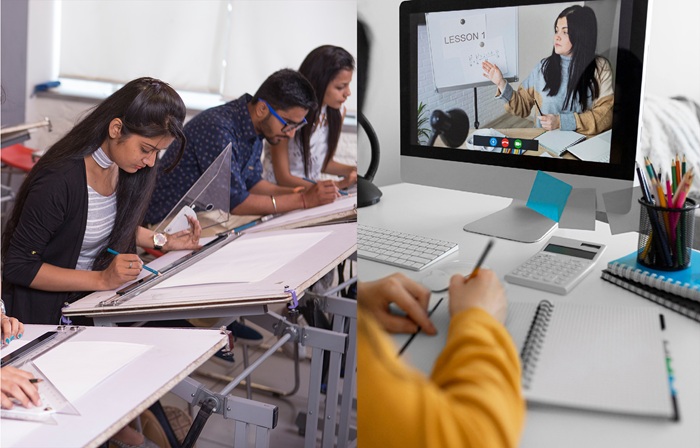Online vs Offline Interior Design Courses: Which One Should You Choose in 2025?
Online vs. offline Interior Design Courses employ different methods to teach interior design, which are changing just as quickly as the styles themselves. The discussion between online and offline interior design courses will be more pertinent than ever in 2025. Selecting the correct learning style can significantly impact your success in this creative field, whether you are just starting or refining your skills.

Online vs Offline interior design courses
In-person interior design courses
Advantages:
- Practical Experience and Hands-On Learning: Interior design is a very practical subject. Offline courses frequently offer direct access to materials, workshops, and studios, giving students practical experience working on actual projects, material samples, and design software. It’s essential for learning technical skills.
- Direct Interaction and Mentorship: Face-to-face engagement with teachers and classmates promotes better relationships, instant comments, and more thorough conversations. This might be useful for working with other projects, receiving individualized advice, and finding solutions.
- Networking Opportunities: Provision of outstanding prospects for interacting with industry experts, guest speakers, and alumni from various institutions.
- Discipline and Structured Environment: Offline classes give the framework and discipline necessary for students who excel in a structured learning environment with set deadlines and schedules to stay on track.
- Campus Resources Access: The learning experience can be improved, and more support can be provided through student groups, material libraries, design labs, and libraries.
Superior Internship and Placement Assistance: Traditional schools frequently have well-established connections with design companies, which result in improved internship and career placement assistance.

Disadvantages:
- Reduced Flexibility: Students with commitments to work, family, or other things may find it difficult to have set timetables, a schedule of studies that has been prepared by a particular institute.
- Increased Costs: Tuition costs are typically higher because of the expense of facilities and instructors. Furthermore, there are costs associated with transportation, physical materials, which consist of sheet work, model making etc.
- Location Restrictions: Students are often restricted to schools in their local area or may be required to move. Daily travel might be costly and take a long time.
- Acquiring Knowledge speed: The course progresses at a predetermined pace, which may be too quick or too slow for some students depending on the understanding of the student.
Online interior design courses
Advantages:
Online courses provide convenience and flexibility that let pupils study wherever and whenever they wish. This is ideal for anybody with a hectic life, including parents, overworked professionals.
- Cost-Effectiveness: Online Interior design courses often prove more economical as they do away with commuting, lodging, and many material expenditures. Resources are available for free or at a little cost from a number of platforms. Students may select from a broader range of courses and teachers from all over irrespective of their country. Rewinding lectures, going through materials, and concentrating more on challenging subjects allow students to personalize their learning experience to their own needs.
- Access to Professional Instructors: Many online courses feature industry experts and professionals from many fields, hence offering a plethora of insights and information.
Online education naturally promotes digital literacy and competence with virtual tools and applications; therefore, it becomes increasingly vital in the contemporary design field. - Possibilities for Specialization: Using the great range of specialized courses often accessible on internet platforms, students may focus on areas such as commercial interiors, sustainable design, or smart home integration.

Disadvantages:
- Decreased Hands-on Practical Learning Experiences: Even though eLearning offers simulated exercises and uses virtual tools, you will not get the benefit of working with real physical materials and in real environments.
- Require Strong Self-Discipline: Without a class time and face-to-face supervision, you will need to self-motivate and have time management abilities to stay on track. Be prepared to deal with your procrastination and temptations to socialize more than you should.
- Minimal Face-to-Face Learning Interaction: You may still have online forums and maybe virtual meetings, but eLearning typically allows for far less interaction with teachers and fellow students in a real-time face-to-face model than you would get in a classroom face-to-face environment.
This can negatively impact collaborative learning, as well as getting timely input on your ideas in the course. Dependent on digital technology and internet access, online studies leave room for interruptions via tech failures and problems as well. - Challenges Networking: There are various networking opportunities online, but online networking may be less effective than in-person experiences and connections in terms of locating local internship and job opportunities. Still have to consider getting distracted while studying from home – family, social media, and other personal obligations come to mind.
Which should you choose?
Choose Offline if you:
- Enjoy being in a structured, traditional classroom.
- Enjoy the kinaesthetic experience of connecting with the materials to complete real-world projects.
- Enjoy the benefits of in-person, social interaction with instructors and fellow students.
- Need local relationships that lead to internship opportunities that begin right away.
- Can afford the additional tuition and living costs associated with an offline option.
Choose Online if you:
- Need maximum flexibility due to work, family, or other commitments.
- They are very self-motivated and disciplined.
- Comfortable with engaging using technology and collaboration in virtual spaces.
- Finances are the overriding consideration by far.
- Want access to more specialized courses, or access to courses that may be provided by instructors anywhere in the world?
For those prospective students interested in educational programs in 2025, it will be important for students to evaluate their situations, favourite learning styles, and eventual career goals. Students will also want to research the specific programs, read reviews, and perhaps even contact alumni to have a clearer idea of the learning experiences available between the two different formats
A Note on IVS School of Art & Design
Whether online or offline, your success depends greatly on the quality of the institution. At IVS School of Art & Design, we offer the best of both worlds—robust offline programs with studio-based learning and personal mentorship, as well as online modules designed to be interactive, flexible, and industry-relevant.
Why IVS?
- Experienced faculty & industry experts
- Strong alumni network & placement support
- Access to state-of-the-art studios and labs
- Regular guest lectures and site visits
- Personalized attention in both formats
- Located in Delhi and Dehradun, with a reputation for excellence in interior design education
As you plan for 2025, consider not only your learning style but also where and how you’ll learn. Choose IVS—where creativity meets opportunity.
Facebook
Instagram
Twitter
Linkedin
Youtube
Latest Blog’s

Online vs Offline Interior Design Courses: Which One Should You Choose in 2025?
Online vs Offline Interior Design Courses: Which One Should You…

Decoding the Logic behind Ancient Architectural Wisdom in Modern Homes
Decoding the Logic behind Ancient Architectural Wisdom in Modern Homes…

Why Interior Design is the Career of the Future: Skills, Trends & Courses You Need to Know
Why Interior Design is the Career of the Future: Skills,…

MULTIFUNCTIONAL SPACES: INTERIOR DESIGN SOLUTIONS FOR COMPACT HOMES
MULTIFUNCTIONAL SPACES: INTERIOR DESIGN SOLUTIONS FOR COMPACT HOMES Our modern…

